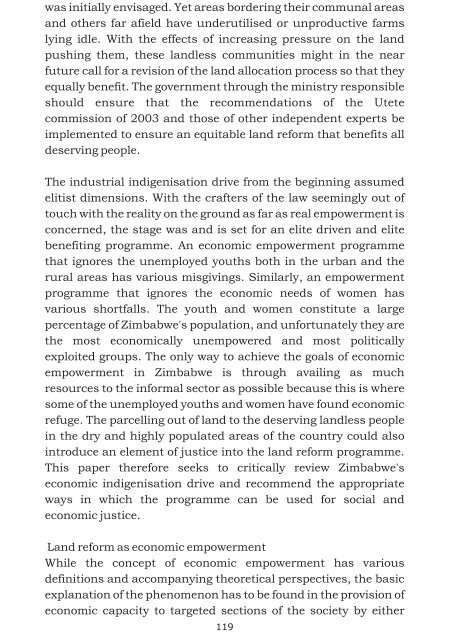Beneficiaries are actors too.pdf - Southern Institute of Peace ...
Beneficiaries are actors too.pdf - Southern Institute of Peace ...
Beneficiaries are actors too.pdf - Southern Institute of Peace ...
You also want an ePaper? Increase the reach of your titles
YUMPU automatically turns print PDFs into web optimized ePapers that Google loves.
was initially envisaged. Yet <strong>are</strong>as bordering their communal <strong>are</strong>as<br />
and others far afield have underutilised or unproductive farms<br />
lying idle. With the effects <strong>of</strong> increasing pressure on the land<br />
pushing them, these landless communities might in the near<br />
future call for a revision <strong>of</strong> the land allocation process so that they<br />
equally benefit. The government through the ministry responsible<br />
should ensure that the recommendations <strong>of</strong> the Utete<br />
commission <strong>of</strong> 2003 and those <strong>of</strong> other independent experts be<br />
implemented to ensure an equitable land reform that benefits all<br />
deserving people.<br />
The industrial indigenisation drive from the beginning assumed<br />
elitist dimensions. With the crafters <strong>of</strong> the law seemingly out <strong>of</strong><br />
touch with the reality on the ground as far as real empowerment is<br />
concerned, the stage was and is set for an elite driven and elite<br />
benefiting programme. An economic empowerment programme<br />
that ignores the unemployed youths both in the urban and the<br />
rural <strong>are</strong>as has various misgivings. Similarly, an empowerment<br />
programme that ignores the economic needs <strong>of</strong> women has<br />
various shortfalls. The youth and women constitute a large<br />
percentage <strong>of</strong> Zimbabwe's population, and unfortunately they <strong>are</strong><br />
the most economically unempowered and most politically<br />
exploited groups. The only way to achieve the goals <strong>of</strong> economic<br />
empowerment in Zimbabwe is through availing as much<br />
resources to the informal sector as possible because this is where<br />
some <strong>of</strong> the unemployed youths and women have found economic<br />
refuge. The parcelling out <strong>of</strong> land to the deserving landless people<br />
in the dry and highly populated <strong>are</strong>as <strong>of</strong> the country could also<br />
introduce an element <strong>of</strong> justice into the land reform programme.<br />
This paper therefore seeks to critically review Zimbabwe's<br />
economic indigenisation drive and recommend the appropriate<br />
ways in which the programme can be used for social and<br />
economic justice.<br />
Land reform as economic empowerment<br />
While the concept <strong>of</strong> economic empowerment has various<br />
definitions and accompanying theoretical perspectives, the basic<br />
explanation <strong>of</strong> the phenomenon has to be found in the provision <strong>of</strong><br />
economic capacity to targeted sections <strong>of</strong> the society by either<br />
119


